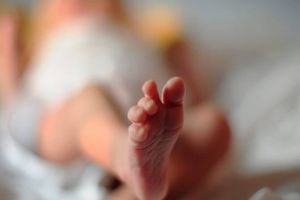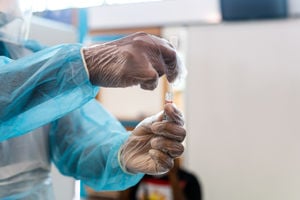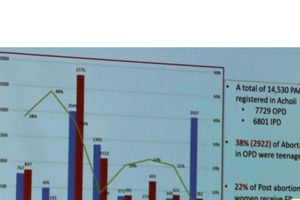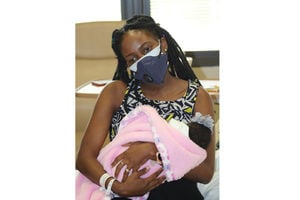
Children play during the national play day celebrations at Kololo Ceremonial Grounds in Kampala on April 30. PHOTO | FRANK BAGUMA
As parents this week prepare to send their children back to school to complete the final term of the 2024 academic year, the talking and thinking needs of the class of 2024 in preschool have been largely challenging.
Research is being undertaken to ascertain the impact pandemic lockdowns had on newborns, with anecdotal evidence showing that the isolating experience that they were subjected to left them with speech and language needs. A large number of children in preschool, for one, need help with toilet training.
Josephine Kataike, a resident of Kabalaga in Makindye Division, Kampala City, gave birth to twins (girls) in September 2020, during the Covid-19 pandemic. Since they were living in a two-roomed rented house in a congested urban environment, her husband instructed her to keep the babies indoors for about two years. The decision was informed by a fear that the infants would contract the deadly viral disease.
“They stayed indoors for close to two years. They would only come out when I was taking them to hospital,” she recalls, with hindsight acknowledging that the absence of interaction with the outside world stalled the progress of the girls in meeting a number of milestones.
Today, Ms Kataike’s twins are in Baby Class. Whereas the girls seem to grasp what is taught in class, their mother has noticed that their speech milestone was affected. She attributes the poor speech exhibited by her children to pandemic curbs that shorn them of much-needed peer interactions.
“They made four years this month [in September] but their speech is not so clear. I’m lucky that they are active participants in class. Their performance is not bad,” Ms Kataike told Sunday Monitor.
Uganda imposed its first pandemic-induced lockdown in March 2020, with more than 15 million children in school sent home. Most of the people who were not considered essential workers were ordered to stay within the confinements of their home. In addition, a dusk-to-dawn curfew also limited people’s movements.
Ms Catherine Bugosi, a Baby Class teacher at Lady Sarah Nursery and Primary School in Kibuli, Kampala, also believes the Covid-19 restrictions have had diverse effects on children. She says this year’s cohort of Baby Class learners is noticeably different from those she has taught before.
“Their behaviour and attention in class is quite different. They are less active and hardly interact with their peers. They also dislike sharing eats. However, we normally remind them that sharing is caring,” Ms Bugosi discloses.
Children who were born during the lockdown turned four this year, with most qualifying to join preschool this year. Middle class awaits them next year. Stella Kaitesi, a Baby Class teacher at the kindergarten section of Kibuli Police Children Primary School, admits that the pandemic restrictions impacted negatively on the children.
“Socialisation is not so good because of the age difference among our learners in Baby Class. We have children who delayed starting school because of Covid-19. They are about six years old yet they are also in Baby Class, studying with babies who are three or four years old,” she says.
Ms Kaitesi, however, says the management of the school has agreed with the parents of children who are six years old to study Baby Class for two terms and then be promoted to Top Class. Those who are brighter are promoted to Primary One.
“We have identified about six learners in Baby Class who are six years old and we have agreed to promote them to Primary One come next year,” Ms Kaitesi explains.
Hasadu Kirabira, the chairperson of National Private Educational Institutions Association (NPEIA), says although such challenges have not been highlighted as far as the local community is concerned, schools are grappling with learners who are older.
“We have not heard about such challenges apart from some learners being overgrown for their class because of the time they remained redundant during the lockdown. When they reported back to school, they couldn’t connect well with the demands of their respective classes,” he says, adding: “On average, you expect a learner to be in Baby Class at the age of four yet some started at the age six.”
Mr Kirabira also notes that learners who were already in the education cycle by then and were transited to next classes under the amalgamated curriculum accessed less content for the previous classes. He says learners who are currently in Primary Seven, for example, were impacted negatively since they missed the content for Primary Four because of the abridged curriculum.
Mr Filbert Baguma, the secretary general of Uganda National Teachers Union (Unatu), says both teachers and parents are still grappling with challenges of mental health as a result of the Covid-19 pandemic and its attendant impacts. He also agrees that the after-effects of the pandemic restrictions continue to negatively impact the learners.
“Teachers face economic pressures because of the meagre salary amid heavy workload. The parents are equally constrained financially. When parents and teachers are affected, obviously the learners will be affected too because they are coming from these homes and going to school where the environment is tense,” Mr Baguma says.
He adds: “Teachers need to be supported so that they appreciate and learn how to deal with the situation. So, that is the missing link. That's why sometimes you hear of cases of suicide and domestic violence, triggered by mental challenges.”
Rashiidah Nankabirwa, a Baby Class teacher at Unique Nursery and Primary School, Kirimya Masaka, says she has not noticed any socialisation or learning difficulties among her learners. When Sunday Monitor interacted with Male Ssenvuma, who was born on February 9, 2021 and is one of Ms Nankabirwa’s learners, he could name his body parts.
Ms Nankabirwa also notes that although she has some learners who are six years and above, they are not a problem to the young ones since their thinking level is almost the same. She, however, acknowledges that pandemic restrictions limited children’s physical activities yet they are critical for proper development.







